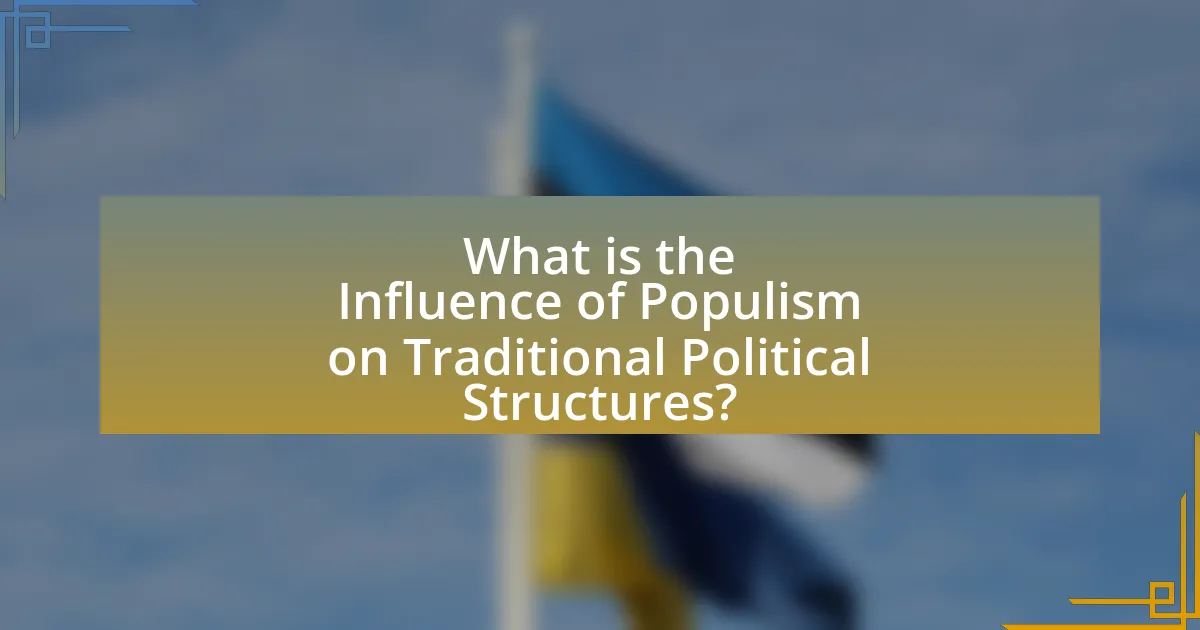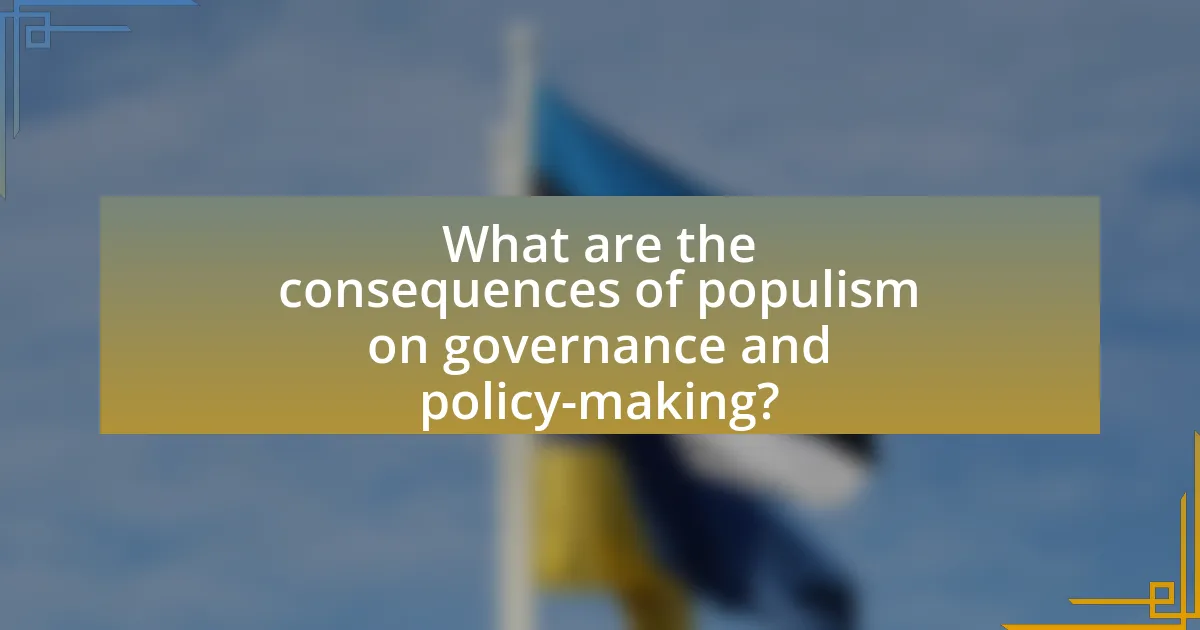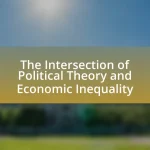The article examines the influence of populism on traditional political structures, highlighting how populist movements challenge established political parties and norms. It discusses the rise of populist leaders who position themselves as representatives of the “common people” against the “elite,” leading to significant shifts in voter behavior and party systems. Key characteristics of populist movements, their communication strategies, and the implications for governance and policy-making are analyzed, along with historical examples that illustrate the impact of populism on democratic institutions. The article also explores the role of media and social media in amplifying populist messages and offers strategies for traditional political structures to adapt to these changes.

What is the Influence of Populism on Traditional Political Structures?
Populism significantly influences traditional political structures by challenging established political parties and norms. This influence manifests through the rise of populist leaders who often position themselves as representatives of the “common people” against the “elite,” thereby undermining traditional party systems. For instance, the election of Donald Trump in the United States in 2016 disrupted the Republican Party’s established hierarchy, leading to a reconfiguration of party loyalty and voter alignment. Additionally, populist movements often prioritize direct appeals to the electorate, bypassing traditional political institutions, which can result in weakened legislative processes and increased polarization. This shift is evidenced by the growing support for populist parties across Europe, such as Italy’s League and France’s National Rally, which have capitalized on public discontent with mainstream politics, leading to significant electoral gains and reshaping the political landscape.
How does populism redefine political engagement?
Populism redefines political engagement by emphasizing direct communication between leaders and the populace, often bypassing traditional political institutions. This shift occurs as populist movements leverage social media and grassroots organizing to mobilize support, creating a more participatory political environment. For instance, the rise of leaders like Donald Trump and Bernie Sanders illustrates how populism can energize voter bases by appealing to emotions and shared grievances, thus altering conventional political discourse. Research indicates that populist strategies can lead to increased voter turnout, as seen in the 2016 U.S. presidential election, where engagement levels surged among previously disenchanted voters.
What are the key characteristics of populist movements?
Populist movements are characterized by their appeal to the common people against the elite, emphasizing a dichotomy between “the people” and “the elite.” These movements often promote nationalism, advocating for policies that prioritize the interests of the native population over foreign influences. Additionally, populist movements typically utilize charismatic leadership, where leaders present themselves as direct representatives of the people’s will, often bypassing traditional political institutions. They also tend to employ emotional rhetoric, focusing on grievances and fears to mobilize support. Historical examples include the rise of leaders like Hugo Chávez in Venezuela and Donald Trump in the United States, both of whom leveraged these characteristics to gain significant political traction.
How do populist leaders communicate with their supporters?
Populist leaders communicate with their supporters primarily through direct and emotional messaging that resonates with their audience’s concerns. They often utilize social media platforms to bypass traditional media, allowing for unfiltered communication and immediate engagement. For instance, leaders like Donald Trump have effectively used Twitter to share their views and rally support, creating a sense of community among followers. This method of communication is characterized by the use of simple language, relatable anecdotes, and a focus on “us versus them” narratives, which reinforces group identity and loyalty. Research indicates that this approach fosters a strong emotional connection, making supporters feel personally addressed and valued, thus enhancing their commitment to the populist cause.
Why is understanding populism important for traditional political structures?
Understanding populism is crucial for traditional political structures because it highlights the growing disconnect between established political elites and the general populace. This disconnect can lead to significant shifts in voter behavior, as evidenced by the rise of populist movements in various countries, such as the election of Donald Trump in the United States and the Brexit referendum in the United Kingdom. These events demonstrate how populism can disrupt traditional party systems, challenge established norms, and reshape political discourse, necessitating a reevaluation of strategies by traditional political entities to remain relevant and responsive to the electorate’s concerns.
What historical examples illustrate the impact of populism?
Historical examples illustrating the impact of populism include the rise of Andrew Jackson in the United States during the 1820s and the emergence of Hugo Chávez in Venezuela in the early 2000s. Andrew Jackson’s presidency marked a shift towards greater democracy and the expansion of suffrage, as he championed the rights of the “common man” against the established elite, leading to significant changes in American political structures. Similarly, Hugo Chávez utilized populist rhetoric to mobilize the masses, implementing social programs that aimed to reduce poverty and redistribute wealth, which fundamentally altered Venezuela’s political landscape and challenged traditional power dynamics. These instances demonstrate how populism can reshape political institutions and influence governance by prioritizing the needs and voices of ordinary citizens over established elites.
How does populism challenge established political norms?
Populism challenges established political norms by promoting a dichotomy between the “elite” and the “common people,” often undermining traditional political institutions and practices. This approach can lead to the delegitimization of established parties and the erosion of trust in democratic processes, as seen in various countries where populist leaders have gained power, such as Hungary under Viktor Orbán and Brazil under Jair Bolsonaro. These leaders often bypass conventional political discourse, favoring direct appeals to the populace, which can disrupt the balance of power and alter governance structures.

What are the mechanisms through which populism influences traditional political structures?
Populism influences traditional political structures primarily through the mechanisms of anti-establishment rhetoric, mobilization of grassroots support, and the reshaping of political discourse. Anti-establishment rhetoric undermines trust in traditional political institutions, as seen in the rise of leaders like Donald Trump and Jair Bolsonaro, who positioned themselves against the political elite. This rhetoric resonates with disillusioned voters, leading to increased grassroots mobilization, which disrupts established political parties and their platforms. Additionally, populism reshapes political discourse by simplifying complex issues into binary choices, often framing them as a struggle between “the people” and “the elite,” which alters how political debates are conducted and understood. These mechanisms collectively challenge the status quo, leading to significant shifts in political dynamics and governance.
How does populism affect party systems?
Populism significantly alters party systems by challenging established political parties and reshaping voter alignments. It often leads to the emergence of new political movements that prioritize the interests of the “common people” against the elite, resulting in a fragmentation of traditional party structures. For instance, the rise of populist parties in Europe, such as the National Front in France and the Five Star Movement in Italy, has disrupted the dominance of mainstream parties, leading to increased polarization and volatility in electoral outcomes. This shift is evidenced by the decline in vote shares for traditional parties, as seen in the 2017 French presidential election, where Emmanuel Macron’s centrist party emerged in response to populist sentiments, illustrating how populism can create new political dynamics and alter the landscape of party competition.
What changes occur in voter behavior due to populist rhetoric?
Populist rhetoric significantly alters voter behavior by increasing political polarization and enhancing voter turnout among specific demographics. This rhetoric often simplifies complex political issues, framing them in a way that resonates emotionally with voters, leading to a stronger identification with populist leaders. For instance, studies have shown that populist messages can mobilize disenchanted voters, particularly those feeling marginalized by traditional political elites, resulting in increased participation in elections. According to research by Cas Mudde and Cristóbal Rovira Kaltwasser, populism can lead to a shift in voter allegiance, as individuals may abandon established parties in favor of populist alternatives that promise to represent the “common people” against the elite. This shift is evidenced by the rise of populist parties in various countries, which have gained significant electoral support by appealing to voters’ frustrations and desires for change.
How do populist parties alter the political landscape?
Populist parties alter the political landscape by challenging established political norms and reshaping voter alignments. They often capitalize on public discontent with traditional parties, presenting themselves as representatives of the “common people” against a perceived corrupt elite. For instance, the rise of populist parties in Europe, such as Italy’s Lega and France’s National Rally, has led to significant shifts in electoral outcomes, often resulting in the fragmentation of traditional party systems. This fragmentation is evidenced by the decline of centrist parties and the emergence of new political coalitions that prioritize populist agendas, thereby transforming the overall political discourse and policy priorities within their respective countries.
What role does media play in the rise of populism?
Media plays a crucial role in the rise of populism by amplifying populist messages and facilitating direct communication between populist leaders and their supporters. This amplification occurs through various channels, including social media platforms, which allow for rapid dissemination of populist rhetoric that often resonates with public discontent. For instance, during the 2016 U.S. presidential election, Donald Trump’s use of Twitter enabled him to bypass traditional media filters, directly engaging with millions of followers and shaping public discourse. Research indicates that populist movements thrive in environments where media can easily spread their narratives, as seen in countries like Brazil and Hungary, where leaders utilized media to consolidate power and undermine opposition.
How do social media platforms amplify populist messages?
Social media platforms amplify populist messages by enabling rapid dissemination and engagement with content that resonates emotionally with users. These platforms utilize algorithms that prioritize sensational and polarizing content, which often aligns with populist rhetoric that simplifies complex issues and appeals to the emotions of the masses. For instance, a study by the Pew Research Center found that 64% of Americans believe social media has a mostly positive effect on the way things are going in the country, indicating that these platforms can shape public opinion and mobilize support for populist leaders. Additionally, the interactive nature of social media allows for direct communication between populist figures and their supporters, fostering a sense of community and reinforcing shared beliefs.
What is the relationship between populism and misinformation?
Populism is closely linked to misinformation, as populist movements often rely on distorted narratives to mobilize support and challenge established political elites. This relationship is evident in how populist leaders utilize social media platforms to disseminate misleading information, creating a simplified dichotomy between “the people” and “the elite.” Research indicates that populist rhetoric frequently exploits emotional appeals and conspiracy theories, which can undermine trust in traditional media and institutions. For instance, a study by the Oxford Internet Institute found that populist parties in Europe have been particularly effective in spreading misinformation during electoral campaigns, thereby influencing public perception and voter behavior.

What are the consequences of populism on governance and policy-making?
Populism significantly alters governance and policy-making by prioritizing the will of the “common people” over established political norms and expert opinions. This shift often leads to the erosion of institutional checks and balances, as populist leaders may undermine democratic institutions to consolidate power. For instance, in Hungary, Prime Minister Viktor Orbán has implemented measures that weaken judicial independence and media freedom, demonstrating how populism can disrupt traditional governance structures. Additionally, populist policies frequently favor short-term, popular measures over long-term, sustainable solutions, which can result in economic instability and policy inconsistency, as seen in Venezuela under Hugo Chávez, where populist policies led to severe economic decline.
How does populism influence policy priorities?
Populism influences policy priorities by shifting focus towards the needs and demands of the general populace, often at the expense of established political norms and elite interests. This shift is evident in the prioritization of issues such as income inequality, immigration control, and national sovereignty, which resonate with the sentiments of the masses. For instance, populist leaders like Donald Trump in the United States emphasized anti-establishment rhetoric and policies aimed at protecting American jobs, which led to significant changes in trade agreements and immigration laws. Such actions demonstrate how populism can redirect governmental focus towards more immediate, emotionally charged issues that appeal to a broad base, thereby altering the traditional policy agenda.
What are the implications for economic policy under populist regimes?
Economic policy under populist regimes often shifts towards protectionism and increased government intervention. This shift is characterized by policies that prioritize domestic industries, such as tariffs on imports, which aim to protect local jobs and businesses. For instance, during the Trump administration in the United States, tariffs on steel and aluminum were implemented to support American manufacturing, reflecting a populist approach to economic policy. Additionally, populist regimes may increase social spending to appeal to their base, as seen in Venezuela under Hugo Chávez, where extensive social programs were funded through oil revenues. These policies can lead to short-term economic gains but often result in long-term fiscal challenges, such as budget deficits and inflation, as evidenced by the economic crisis in Venezuela following years of populist governance.
How does populism affect social policy and welfare programs?
Populism significantly influences social policy and welfare programs by prioritizing the needs and demands of the general populace over established political norms. This approach often leads to the expansion of welfare programs aimed at addressing immediate public concerns, such as healthcare, education, and unemployment benefits. For instance, in countries like Venezuela under Hugo Chávez, populist policies resulted in increased social spending and the implementation of extensive welfare programs, which aimed to reduce poverty and inequality. However, these policies can also lead to unsustainable fiscal practices, as seen in Argentina, where populist governments increased social spending without adequate revenue, resulting in economic instability. Thus, while populism can enhance social welfare in the short term, it may also create long-term challenges for fiscal sustainability and governance.
What challenges do traditional political structures face from populism?
Traditional political structures face significant challenges from populism, primarily through the erosion of established political norms and the rise of anti-establishment sentiments. Populism often capitalizes on public discontent with traditional parties, leading to a decline in their legitimacy and authority. For instance, the election of populist leaders in various countries, such as Donald Trump in the United States and Jair Bolsonaro in Brazil, illustrates how populism can disrupt conventional political dynamics by appealing directly to the electorate’s emotions and grievances, often bypassing traditional party mechanisms. This shift can result in increased polarization, as populist movements frequently frame political discourse in terms of “us versus them,” undermining collaborative governance and consensus-building essential for stable political systems.
How do populist movements impact democratic institutions?
Populist movements significantly impact democratic institutions by challenging established political norms and structures. These movements often promote a dichotomy between “the people” and “the elite,” which can lead to the erosion of trust in traditional political parties and institutions. For instance, the rise of populist leaders in various countries has resulted in weakened checks and balances, as seen in Hungary under Viktor Orbán, where the government has undermined judicial independence and media freedom. Additionally, populism can lead to increased polarization within society, making consensus-building more difficult and destabilizing democratic governance. This trend is evidenced by the growing divide in public opinion and political discourse in countries like the United States, where populist rhetoric has intensified partisan conflict.
What strategies can traditional parties adopt to respond to populism?
Traditional parties can adopt several strategies to respond to populism, including re-engaging with their core constituents, addressing economic inequalities, and enhancing transparency and accountability. By focusing on the needs and concerns of their traditional voter base, parties can counteract the appeal of populist movements that often exploit discontent. Addressing economic inequalities through policies that promote social welfare and equitable growth can diminish the grievances that populist rhetoric capitalizes on. Furthermore, enhancing transparency and accountability in governance can rebuild trust and demonstrate a commitment to democratic principles, which are often undermined by populist leaders. These strategies are supported by research indicating that traditional parties that adapt to the changing political landscape and address the root causes of populism can effectively mitigate its influence.
What best practices can traditional political structures implement to adapt to populism?
Traditional political structures can implement inclusive dialogue and engagement with citizens to adapt to populism. By fostering open communication channels, these structures can better understand the concerns and aspirations of the populace, which is essential in countering the appeal of populist movements. For instance, regular town hall meetings and participatory budgeting initiatives have been shown to enhance civic engagement and trust in government, as evidenced by successful implementations in cities like Porto Alegre, Brazil, where participatory budgeting led to increased public satisfaction and investment in community needs. Additionally, traditional political entities should prioritize transparency and accountability, as studies indicate that perceived corruption and lack of responsiveness contribute to the rise of populism. By adopting these best practices, traditional political structures can effectively address the challenges posed by populism and strengthen democratic governance.


